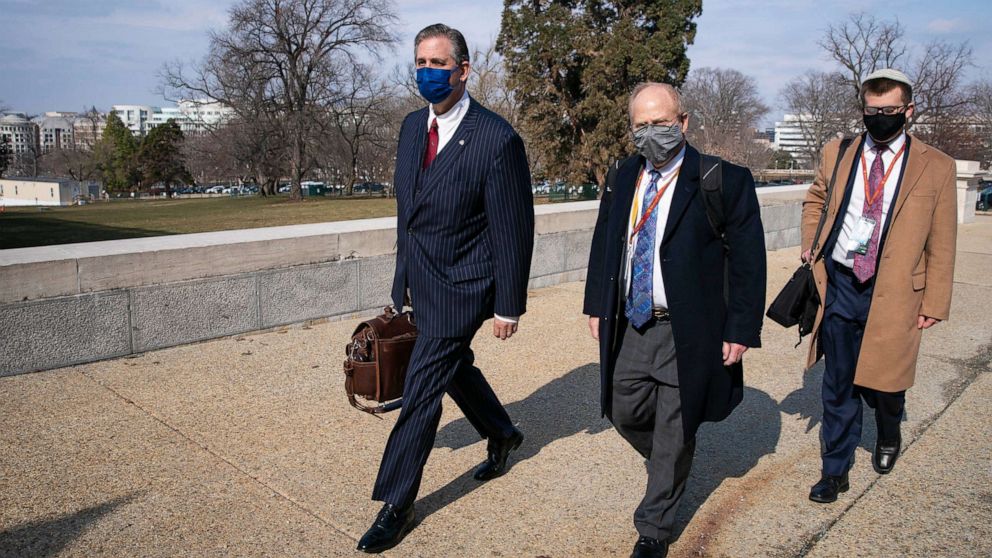As Trump's impeachment defense begins, 2 new attorneys step into the spotlight
Former President Donald Trump's legal team will step onto the brightest stage of their careers on Friday, and almost everyone -- including their high-profile client -- is waiting to see whether they are up to the task.
Bruce L. Castor of Pennsylvania and David Schoen of Georgia signed on to defend the former president at his second impeachment trial only nine days before delivering Tuesday's opening statements -- a performance that has attracted bipartisan criticism and even the ire of a Twitter-less Trump, according to sources familiar with his reaction.
Now, with the Senate vote expected to fall short of the two-thirds majority needed to convict Trump, their biggest test may be in the court of public opinion: After what many saw as a gripping performance by Democratic impeachment managers in their opening argument, can this team convince Americans that Trump should not be convicted?
House Democrats filed a single article of impeachment against Trump on Jan. 13 for "incitement of insurrection" following the violent and deadly siege on the U.S. Capitol one week earlier.
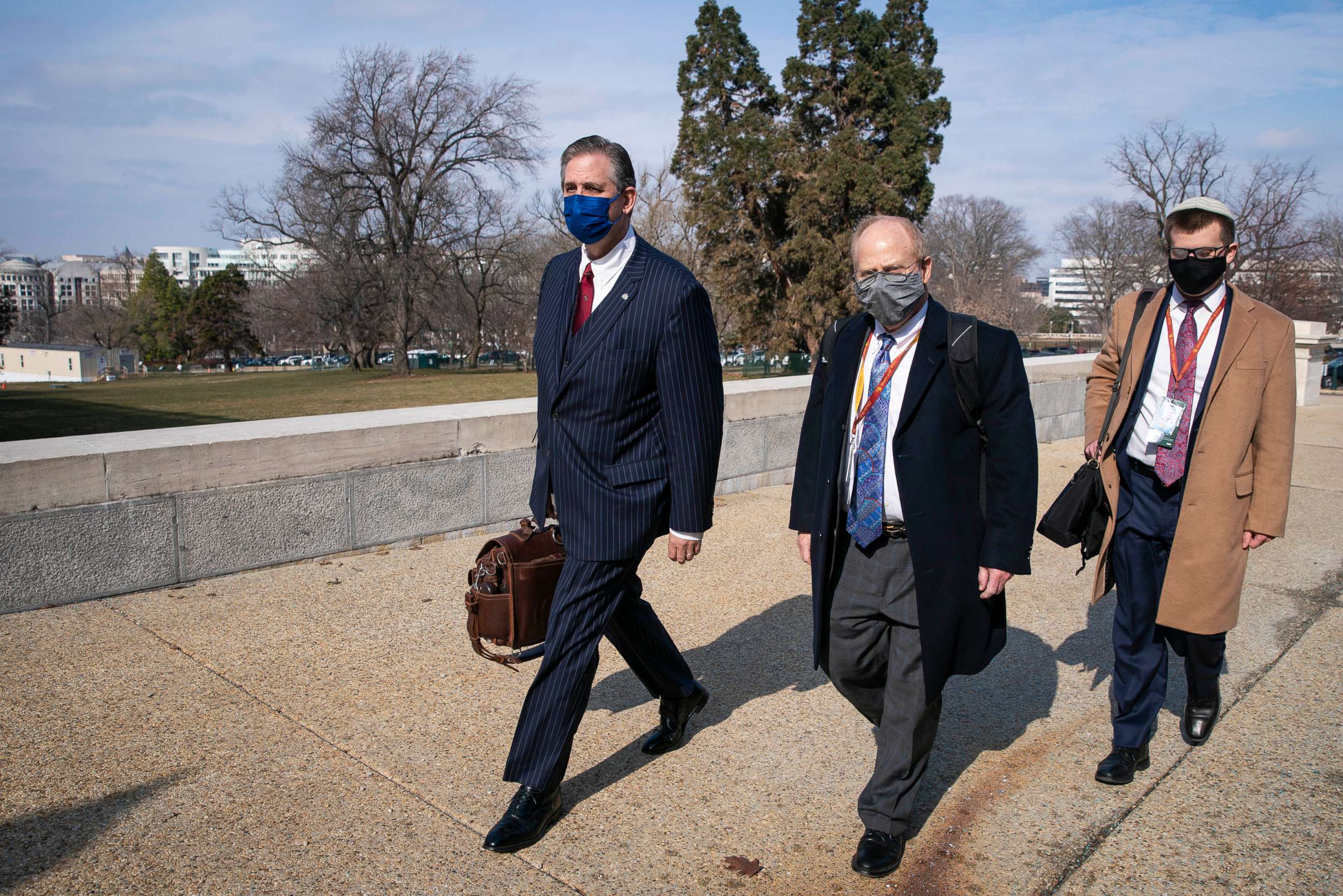
Over the past week, House impeachment managers have sought to tie the mob's actions on Jan. 6 to Trump's rhetoric, showing graphic video clips of his supporters attacking members of law enforcement in between soundbites of the then-president encouraging his supporters to "fight like hell" on his behalf to overturn the presidential election.
"We're going to walk down to the Capitol," Trump told rally-goers, saying that "you have to show strength, and you have to be strong."
Castor and Schoen will offer their rebuttal of the case against Trump on Friday.
Schoen previewed their strategy in an interview with Fox News on Thursday, emphasizing that he anticipates their defense "should be as short as possible."
"Now we make our presentation, starting tomorrow," Schoen said. "I think you will at least be moved by what you see and get a much better picture of exactly what is going on in the hypocrisy and some of the positions taken by the House managers in this case."
Castor and Schoen faced scrutiny earlier this week after critics said their opening statements meandered and at times lost the attention of their audience in the Senate chamber, exacerbating concern among some of Trump's supporters over whether his lawyers are fit to present a sufficient defense.
"I've seen a lot of lawyers and a lot of arguments, and that was not one of the finest I've seen," said Sen. John Cornyn, R-Tex.
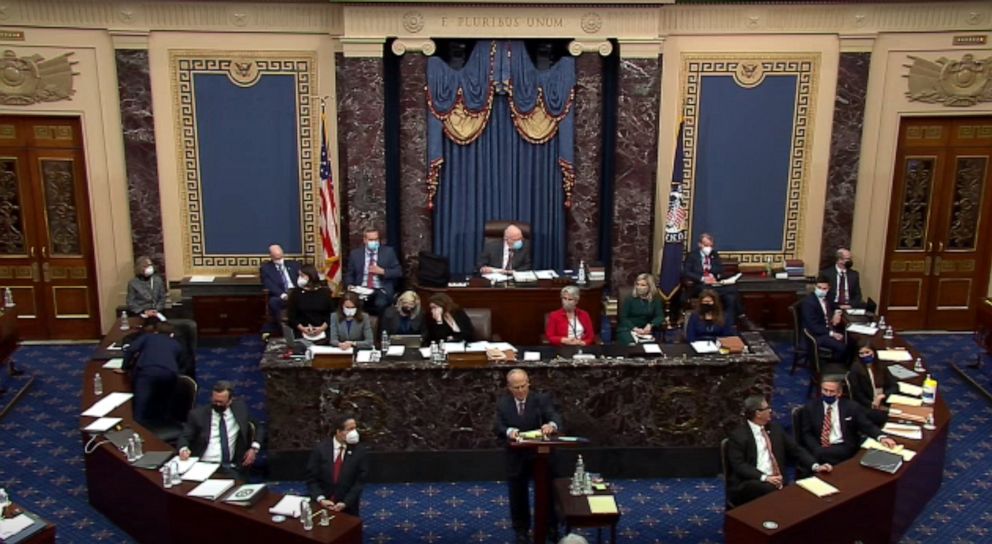
Sources familiar with the former president's reaction told ABC News that Trump, who is keeping tabs on the impeachment trial from his Mar-a-Lago Club, was displeased with the performance of his defense team in their initial arguments. Trump was described by the sources as being stunned at times during the presentation, specifically when Castor complimented the impeachment managers' opening statements.
For the attorneys, who each bring with them a lengthy and diverse legal resume, the impeachment trial presents a new challenge. Castor has had a prolific -- and at times controversial -- career as a local prosecutor and defense attorney in and around Philadelphia. But it is a career that has offered him little experience in the types of federal issues he now faces.
In 2005, Castor made national headlines when, as a prosecutor, he declined to bring charges of sexual assault against actor Bill Cosby, who years later was tried and convicted in one of the highest-profile cases of the past decade. Castor stepped down as district attorney for Montgomery County, the northern suburb of Philadelphia, at the end of his term in 2008 after deciding not to run for the elected position again, and over the next several years he served in various local and state-level positions, including a short stint as solicitor general of Pennsylvania.
Since entering private practice in 2013, Castor has served as a defense attorney in about a dozen cases filed in federal court, according to an online database of federal cases. Many of the cases have involved breach-of-contract allegations and business-related disputes, but others were more unusual.
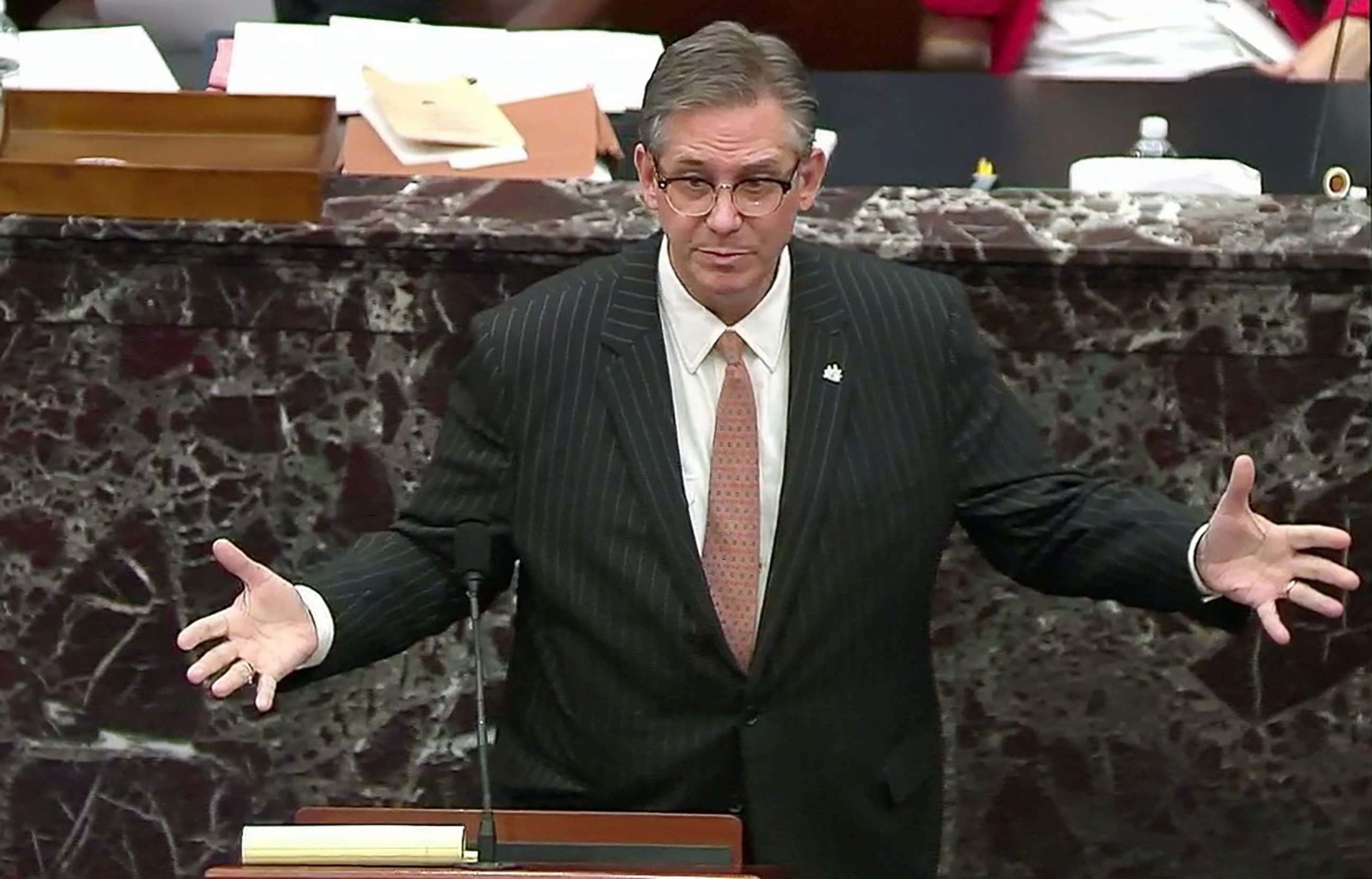
In a 2018 case, Castor represented a California company whose large cash payment for manufacturing equipment had been seized by the U.S. Department of Homeland Security. According to court records, when two men hired to drive the payment cross-country were pulled over in their pickup truck in Pennsylvania, police found the money -- $376,000 in cash -- inside a box. Suspecting they had stumbled onto criminal activity, the police turned the cash over to federal authorities, who returned the money only after Castor filed a lawsuit against DHS. No charges were ever filed.
In another case from 2019, Castor represented a Philadelphia doctor who sued his former employer, Temple University, for defamation after he was accused of sexual harassment by colleagues and subsequently fired. In court documents, Castor insisted the school conducted a "sham prosecution" of his client based on "an inept, unprofessional, and incomplete 'investigation' into [the] false allegations." The case is still pending.
Schoen, an Atlanta-based attorney whose website describes his practice as covering "federal criminal defense and civil rights," has spent decades litigating and defending clients across a broad spectrum of legal cases throughout the country. His website biography advertises his experience in handling litigation ranging from international organized crime cases to personal injury.
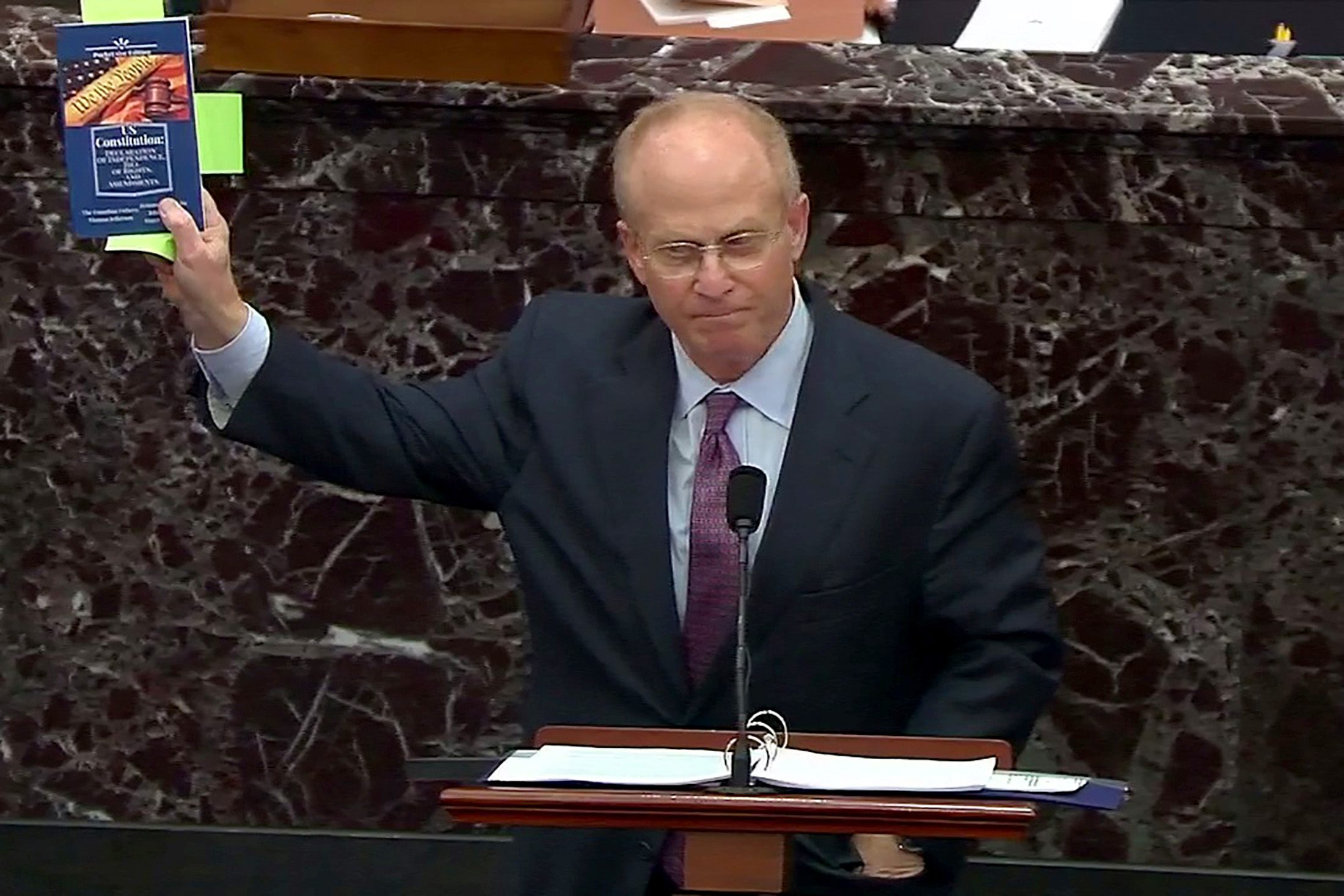
Most recently, Schoen represented veteran Republican political operative Roger Stone in his efforts to appeal a 2019 conviction on charges brought by special counsel Robert Mueller. Stone had been found guilty on five counts of lying to Congress, one count of witness tampering and one count of obstruction of a proceeding -- but Trump later commuted Stone's sentence, so the appeal was dropped.
A third member of Trump's legal team, Philadelphia-based personal injury and criminal defense attorney Michael van der Veen, drew attention earlier this week after the Washington Post reported that he had recently sued Trump and the U.S. Postal Service over their efforts to curtail mail-in voting.
Van der Veen's client, an independent congressional candidate from Pennsylvania, sued Trump and the mail agency over postal system changes the client said would make it more difficult to vote absentee during the pandemic. The lawsuit alleged "repeated claims by President Donald J. Trump that voting by mail is ripe with fraud, despite having no evidence in support of these claims."
The case was settled shortly after the election.
Neither van der Veen, Castor or Schoen immediately responded to emails from ABC News seeking comment.
